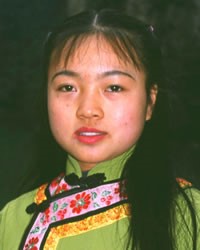Mozhihei in China

Photo Source:
Copyrighted © 2026
Create International All rights reserved. Used with permission |
Send Joshua Project a map of this people group.
|
| People Name: | Mozhihei |
| Country: | China |
| 10/40 Window: | Yes |
| Population: | 6,600 |
| World Population: | 6,600 |
| Primary Language: | Tujia, Southern |
| Primary Religion: | Ethnic Religions |
| Christian Adherents: | 0.00 % |
| Evangelicals: | 0.00 % |
| Scripture: | Unspecified |
| Ministry Resources: | No |
| Jesus Film: | No |
| Audio Recordings: | No |
| People Cluster: | Tibeto-Burman, other |
| Affinity Bloc: | Tibetan-Himalayan Peoples |
| Progress Level: |
|
Introduction / History
Han Chinese peasants migrated into western Hunan in the early twelfth century, bringing with them modern tools and farming expertise. Some Mozhihei youth joined the communist Long March after it passed through their area in 1935. Some traveled all the way to northern China and fought against the Japanese.
Although they are considered part of the Tujia nationality, the Mozhihei speak a very different language from other Tujia people. Tujia is the historical Chinese name for this group. The Southern Tujia call themselves Mozhihei, while the Northern Tujia speakers use the autonym Bizika. The two Tujia groups have separate customs, names and languages.
What Are Their Lives Like?
The Mozhihei have a rich repertoire of traditional songs and dances. "The Hand Waving Dance, with its seventy ritual gestures that represent war, hunting, farming and other aspects of life, is popular at the New Year's festival." The Mozhihei grow a variety of crops including wet rice, wheat, maize, and sweet potatoes. Cash crops include beets, cotton, and tea. Mozhihei men are proficient hunters, trappers, and fishermen. From the time a Mozhihei girl is 10 or 11 years old, she begins practicing how to cry sufficiently for her future wedding, to show the wedding guests how much she will miss her parents. "How well she cries is considered a test of her abilities as well as her integrity. So, a girl who does not perform well enough in crying will probably be looked down upon."
What Are Their Beliefs?
The beliefs of the Mozhihei are a mixture of shamanism, Daoism, ancestral worship, and ancient beliefs involving ghosts and evil spirits. Many of the Mozhihei who have moved to urban areas for work or education now consider themselves atheists.
For centuries they have lived and died without any knowledge of the Savior of the world. Few missionaries have ever braved the remote mountains of western Hunan, leaving it one of the most unevangelized areas in China today. The nearest Christian community is probably the 2,000 believers, mainly Han, in Danjiang County in neighboring eastern Sichuan Province.
What Are Their Needs?
Without the guidance of Christ, these people are like sheep without a shepherd. They need the good shepherd in their families and communities.
Prayer Points
Pray for the authority of Christ to bind hindering spiritual forces to lead them from darkness to light.
Pray for signs and wonders to happen among them and for great breakthroughs with a rapid multiplication of disciples and house churches.
Pray for bold workers who are driven by the love of the Holy Spirit to go to them.
Pray for an unstoppable movement to Christ among them.